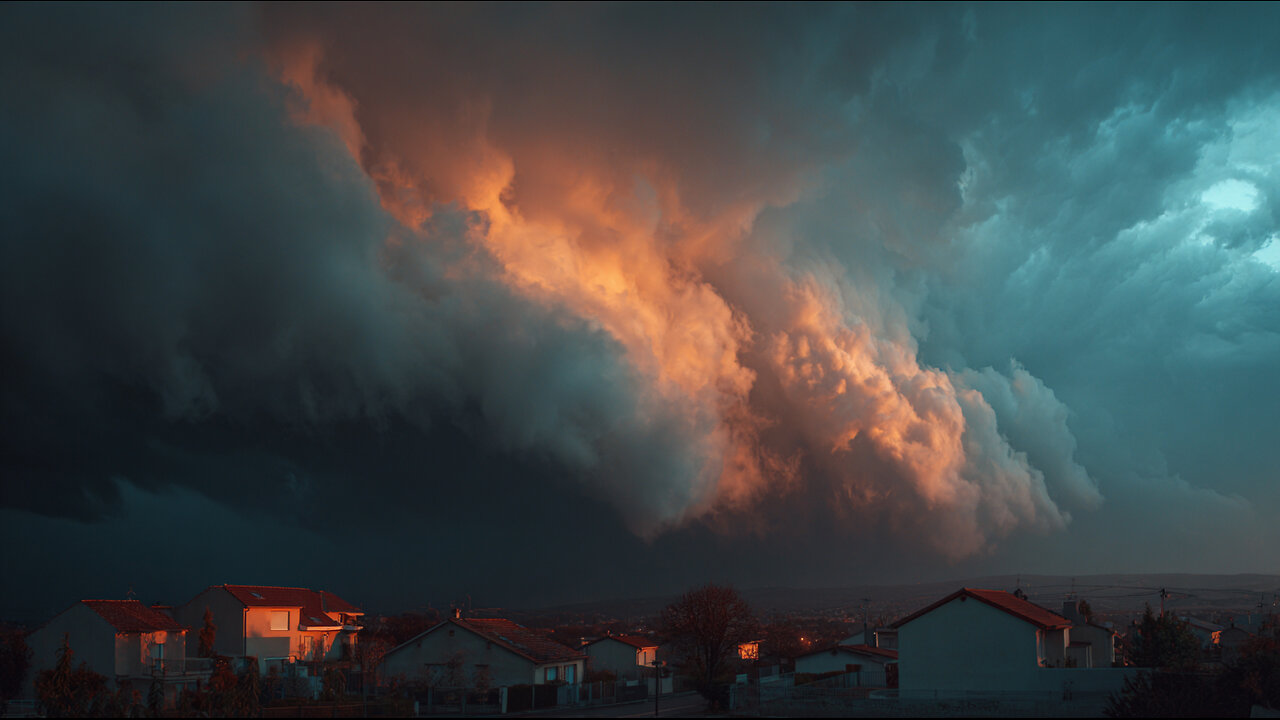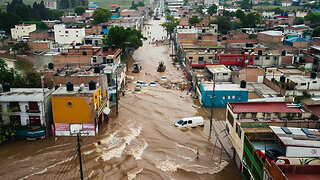Premium Only Content

France Hit by Rare Derecho Storm: Hail, Tornado, and 80+ MPH Winds!
After a wave of extreme heat exceeding ninety-five degrees Fahrenheit, France was hit by severe weather on June 25, bringing violent winds, torrential rain, thunderstorms, large hail, and even a tornado.
Experts classified the event as a rare “derecho” — a powerful and long-lasting storm stretching nearly four hundred thirty-five miles.
The disaster claimed two lives: in the commune of Piquecos (Tarn-et-Garonne), a twelve-year-old boy was killed when a tree fell on him, and in the town of Mayenne, a man riding an ATV died after colliding with a tree that had fallen onto the road.
According to the Civil Protection Service, seventeen people were injured in total, one of them in critical condition.
Météo-France issued an orange alert for severe thunderstorms across forty-four departments of the country.
Between Wednesday night and Thursday morning, firefighters carried out two thousand five hundred emergency operations throughout France.
In several regions, wind gusts exceeded eighty miles per hour: in Montbeugny (Allier), a speed of eighty-four miles per hour was recorded, and in Bessey (Côte-d'Or), winds reached eighty-three miles per hour — breaking historical records.
About one hundred ten thousand homes were left without electricity.
Rail services were disrupted across the country. Routes between Paris and Clermont, Bourges and Vierzon, as well as Toulouse and Brive, were either suspended or significantly delayed.
The Ministry of Education stated that students who missed national exams due to the storm would be given the opportunity to retake them.
In Normandy, the region's largest forest — Forêt de Lyons — suffered major damage: nearly one-third of its area, approximately eight thousand six hundred acres, was affected by violent winds.
Within minutes, the ancient Church of Saint-Pierre in Valailly was completely destroyed — a devastating loss, as the church had only just been restored after thirty-five years of work.
In Paris, the storm brought heavy rainfall and wind gusts of up to seventy miles per hour. Trees collapsed onto cars, several metro stations were shut down, and the southern parts of the city were flooded, severely disrupting traffic.
The rain was so intense that visibility dropped to less than one hundred sixty feet.
Leaks inside the National Assembly forced a temporary halt to parliamentary debates.
Some residents narrowly escaped tragedy. One man recounted how he and his wife were inside their car when a tree suddenly fell and crushed it. The vehicle was completely destroyed, but thankfully, both survived.
This powerful and unexpected storm in France is yet another reminder that natural disasters are becoming increasingly unpredictable.
Time and again we hear the same phrases: “record-breaking,” “first time,” “nobody was prepared.”
Many people still live in the illusion of safety, assuming that disaster won’t reach them — simply because it hasn’t yet. But millions around the world have already lost their homes, their loved ones, and their future.
We still have a chance, and it’s critical not to waste it. That chance lies in technological solutions proposed by the international scientific community ALLATRA. One of these technologies has already proven its effectiveness by reducing the intensity and frequency of disasters in practice.
You can learn more in the video “Declaration That Will Shake Science”.
-
 5:20
5:20
AllatRa TV
7 days agoHistoric Flooding in Mexico | 31 States Hit by Relentless Storms
671 -
 LIVE
LIVE
FreshandFit
10 hours agoCan They Give A Man What They Never Gave Before? ft. Charleston White, Aaron The Plumber & Dom Lucre
13,759 watching -
 2:29:28
2:29:28
Badlands Media
12 hours agoDevolution Power Hour Ep. 400: The 400th Episode Celebration – Trump’s Gamble, Biden’s Fall, and the Great American Reckoning
70.9K34 -
 2:05:10
2:05:10
Inverted World Live
6 hours agoHypersonic UFO Over Minneapolis | Ep. 128
74.6K13 -
 2:50:41
2:50:41
TimcastIRL
6 hours agoDemocrat Press IS DEAD, Timcast JOINS Pentagon Press Corps Sparking OUTRAGE | Timcast IRL
220K86 -
 1:32:24
1:32:24
Tucker Carlson
5 hours agoTucker and MTG on the 5 Pillars of MAGA and the Snakes in Washington Trying to Tear Them Down
58.7K202 -
 LIVE
LIVE
Side Scrollers Podcast
3 days ago🔴FIRST EVER RUMBLE SUB-A-THON🔴DAY 3🔴PLAYING MIKE TYSON'S PUNCH OUT TILL I WIN!
915 watching -
 17:14
17:14
Mrgunsngear
7 hours ago $10.21 earnedUpdate: Current Glocks Discontinued & Glock V Series Is Coming!
34.2K31 -
 2:52:54
2:52:54
Barry Cunningham
7 hours agoMUST SEE: PRESIDENT TRUMP NATO PRESSER! AND NEW YORK CITY MAYORAL DEBATE!
57.7K48 -
 13:15
13:15
Cash Jordan
9 hours ago"INVASION" Mob STRIKES Chicago Jail… FRONTLINE Marines IGNORE Judge, SMASH Illegals
42.3K48